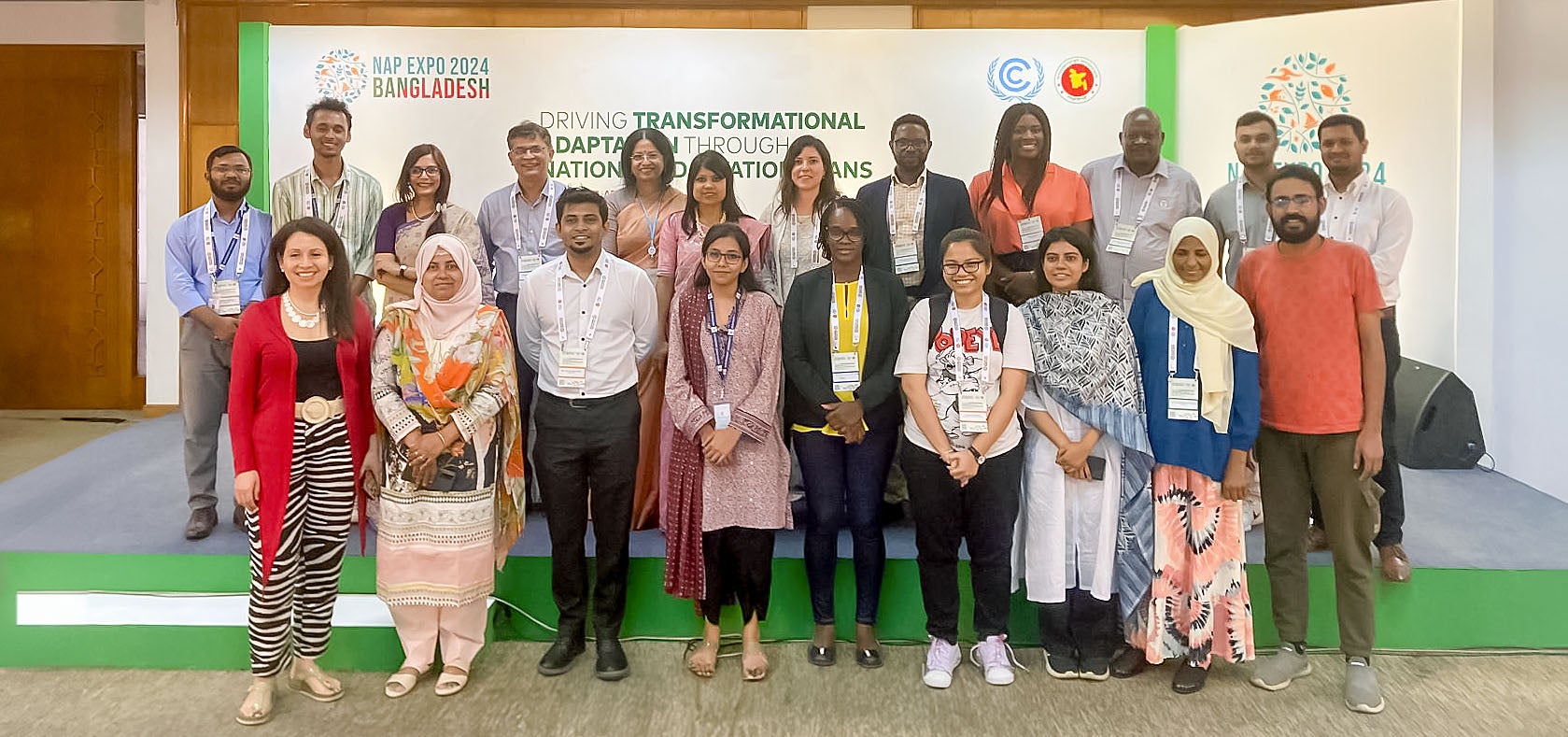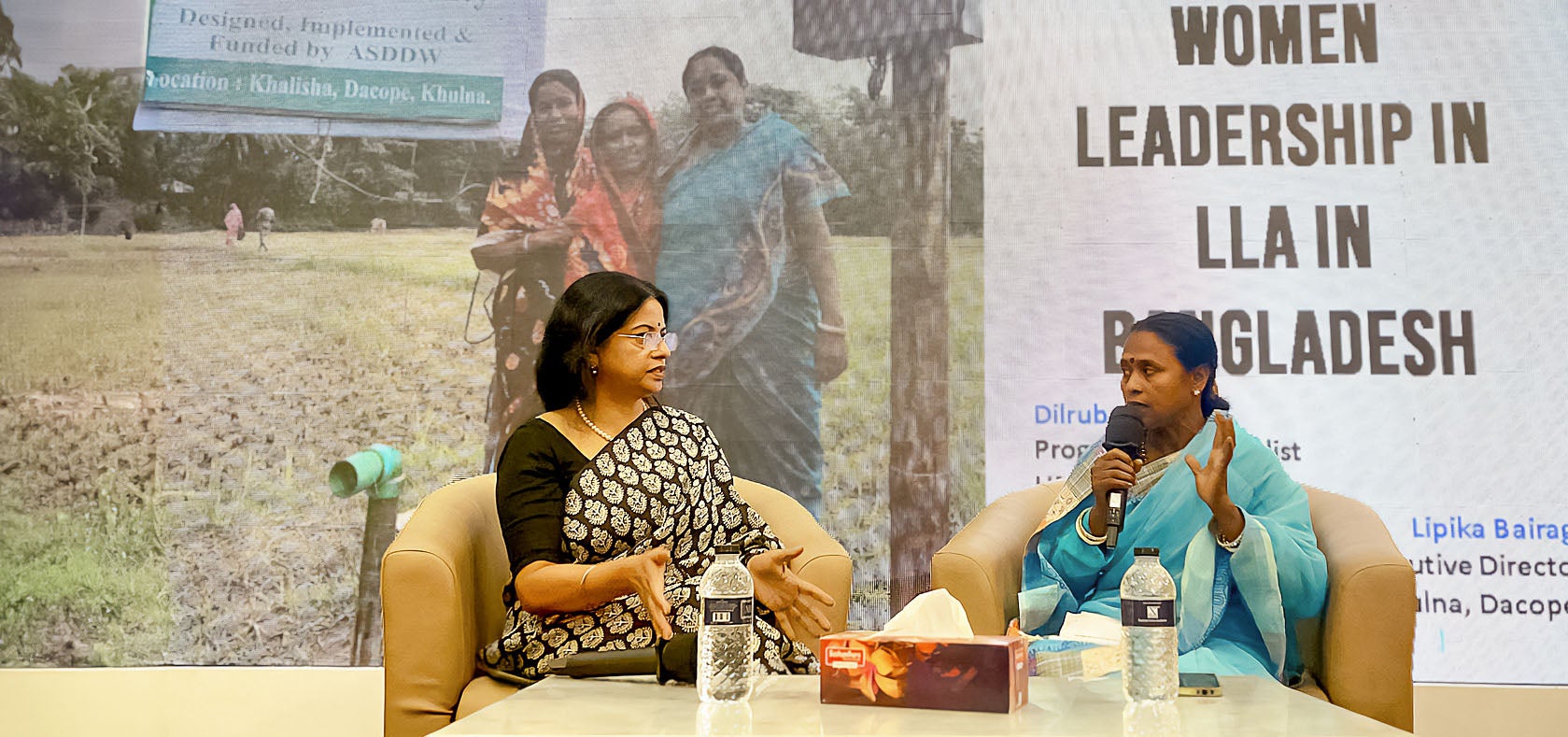UN Women leads gender-responsive climate adaptation at NAP Expo 2024
Date:
Author: Maud Aba’a

The NAP Expo 2024, held in Dhaka, Bangladesh, and organized by the Least Developed Countries (LDCs) Expert Group under the United Nations Framework Convention on Climate Change (UNFCCC), convened global leaders, experts, and advocates to advance climate national adaptation plans (NAPs). The Expo aimed to facilitate the exchange of experiences, foster partnerships, and promote the development and implementation of effective adaptation strategies. UN Women played a pivotal role in this event, demonstrating its commitment to gender-responsive climate adaptation.
Throughout the Expo, UN Women conducted training sessions, organized a short talk on women’s leadership, distributed knowledge products, and showcased successful projects, highlighting the importance of gender-transformative adaptation strategies. Its efforts emphasized the critical role of women in driving sustainable climate solutions and the significant benefits of incorporating gender perspectives into national adaptation plans.
“Integrating a gender perspective into national adaptation plans is essential for effective climate action as women offer unique knowledge and expertise. The inspiring story of women leaders like Lipika Bairagi at the NAP Expo 2024 serve as a testament to the transformative impact of empowering women and marginalized communities as part of our collective efforts to combat the climate crisis,” said Gitanjali Singh, UN Women Bangladesh Country Representative.
On April 23 and 24, UN Women co-facilitated a training session focused on the inclusion of vulnerable groups and communities, such as women, youth, Indigenous Peoples, and local communities, in implementing NAPs. Over 34 national and international participants, representing governments, UN agencies, non-governmental organizations (NGOs), and academic institutions, gathered to share best practices. The training stressed the importance of addressing the unique needs of women and girls in climate adaptation plans, showcasing successful projects from Bangladesh and Viet Nam. The session also equipped participants with the tools and knowledge necessary for inclusive and equitable adaptation efforts.

A highlight of UN Women’s engagement was a talk show on April 25 titled "Women’s Leadership in Locally Led Adaptation." The talk featured Lipika Boiragi, a rural woman leader from Khulna and Executive Director of the Association for Social Development & Distressed Welfare (ASDDW), a partner of the UN Women-UNEP joint programme EmPower: Women for Climate-Resilient Societies.
Boiragi shared her inspiring journey in leading community adaptation efforts and providing firsthand insights into the challenges and successes of promoting women’s leadership at the local level: “There is high salinity in my village in southern Bangladesh, making it difficult to grow crops. I remember watching a YouTube video about a local adaptation practice in Latin America where they used a solar pump to preserve rainwater and then filter it for irrigation. We realized we could make a similar pump using local technology at a relatively low cost. With our limited resources, we built one for around 250,000 BDT (approximately 2,200 USD),” said Boiragi. “Now, we run the solar pump locally, and it supports the agricultural work of five families at a time," she added.
The event was broadcast live on UN Women Bangladesh Facebook page, reaching a wider audience and sparking engaging discussions on the crucial role of women in climate solutions.
Throughout the event, attendees could watch videos that vividly portrayed the stories of participants in UN Women’s adaptation interventions in Asia-Pacific and West Africa. These videos highlighted the impact of renewable energy and climate-resilient agriculture in improving the livelihoods of vulnerable women, providing an immersive experience that showcased the real-world benefits of gender-responsive adaptation strategies.
UN Women’s extensive engagement at the NAP Expo 2024 underscored the importance of integrating gender perspectives into climate adaptation efforts. By showcasing best practices and the replicability of successful projects, they inspired participants to scale up investments in women and marginalized communities.